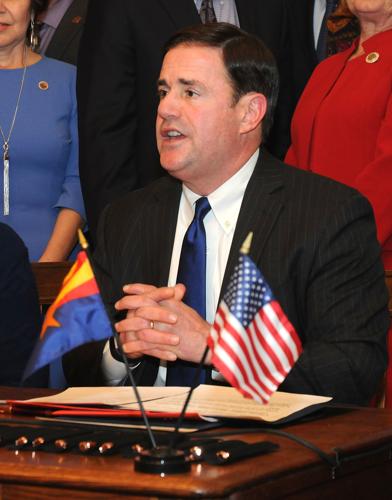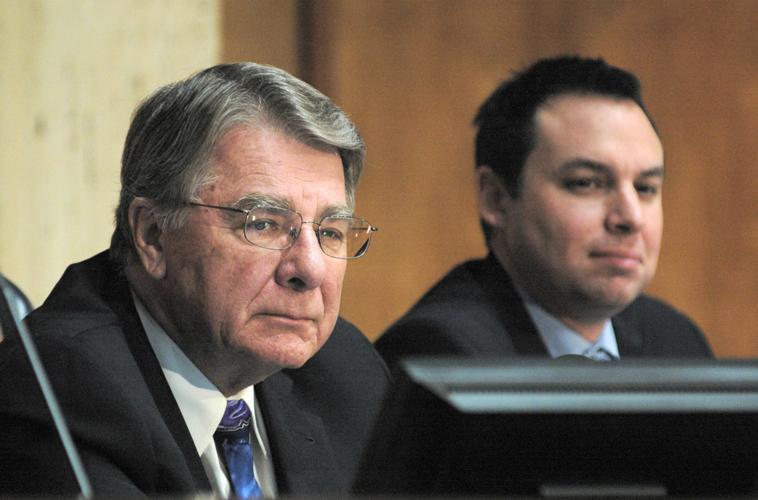PHOENIX — Arizona is finally ready to curtail — but not stop — the ability of corporations to divert what they owe in state income tax to instead help send children to private and parochial schools, a system of credits that threatened to reduce corporate tax collections to zero.
Legislation signed Thursday by Gov. Doug Ducey will rein in a decade-old law that allows corporations to get a dollar-for-dollar credit against their income taxes for money they donate to “scholarship tuition organizations.” These STOs, in turn, provide funds parents can use to pay the tuition and fees of their children at private schools.
The credit remains. But what is changing with the new law is the amount of dollars that can be diverted.
It originally started out with a $10 million cap. But it was engineered so that could increase by 20% a year.
For the current year, the amount of diverted dollars has ballooned to $89.2 million. And left unabated, it would reach nearly $222 million by the 2023-2024 school year.
More to the point, there is no limit. And given that corporate tax collections are not increasing at 20% a year — revenue estimates for this year are at $427 million — they could owe the state nothing before the end of the decade.
“It’s reaching a growing number of our corporate dollars,” noted Sen. J.D. Mesnard, R-Chandler, in pushing the measure.
The new law curbs the annual increase to 15% beginning in the 2020-2021 school year, dropping to 10% the year after that, 5% the following year and then settling at 2% or the rate of inflation, whichever is greater, in the 2023-2024 school year.
The financial difference is significant: By that year, the $222 million that corporations would otherwise have been allowed to divert will be reduced to $145 million. And with the new cap, annual increases in foregone corporate revenues after that will be in the $3 million range.
The scholarship program predates — and is different from — the vouchers that provide state funds directly to parents to pay for tuition and other expenses at private and parochial schools.
With scholarships, donor organizations, many of them linked to specific schools or religious groups, determine the dollars given to any student. By contrast, the amount of the voucher is limited by state law.
It originally started out as a program to allow individuals to divert some income tax dollars to these STOs. Under current law, individual taxpayers can get a credit of up to $555 — double that for couples — for amounts donated.
It was Senate President Steve Yarbrough, R-Chandler, the executive director and general counsel of the Arizona Christian School Tuition Organization, who led the fight to open the door for corporate donations to generate more scholarship dollars.
Yarbrough, while selling the change as having just a $10 million price tag, also was the one who inserted that 20% annual inflation increase that has boosted the cost to that $89.2 million. And it was Yarbrough who, until his retirement last year, blocked efforts to reduce that inflation factor.
He told Capitol Media Services several years ago that his sponsorship of that legislation — and his defense against having the annual increases scaled back — was based on his personal belief that more dollars meant more educational opportunity for students who otherwise could not afford to attend a private or parochial school.
But Yarbrough, until he stepped down from ACSTO in late 2017, also had a personal and financial interest in scholarships.
ACSTO was the second-largest tuition organization in the state, behind only to the program run by the Catholic Church.
It collected more than $200 million in donations between 1998 and 2017, giving out $173 million of that in scholarships as Arizona law allows sponsoring organizations to keep up to 10% for costs.
But Yarbrough said he had nothing to gain from his sponsorship of the corporate tax credits, saying all the money he gave out came from private and not corporate donations.
In his last year in office — and after stepping aside from ACSTO — Yarbrough did offer to support reducing that 20% year-over-year inflator. But that died when he insisted it be paired with actually increasing the amounts of some other tax credits available for these private and parochial school scholarships.
This year’s version, sponsored by Mesnard, had no such trade-off. It gained unanimous approval of both the House and Senate.
During 2017, the most recent year for which records are available, Internal Revenue Service filings by ACSTO show that out of the $21.3 million the organization collected, Yarbrough was paid $98,241 in annual salary plus another $27,840 in what was listed as the cost of fringe benefits and life insurance.
On top of that, the organization paid another $659,300 to HY Processing, a firm owned by Yarbrough and his wife, Linda, to handle the accounting and paperwork for the scholarships. And ACSTO was renting space in a building owned by Yarbrough.





